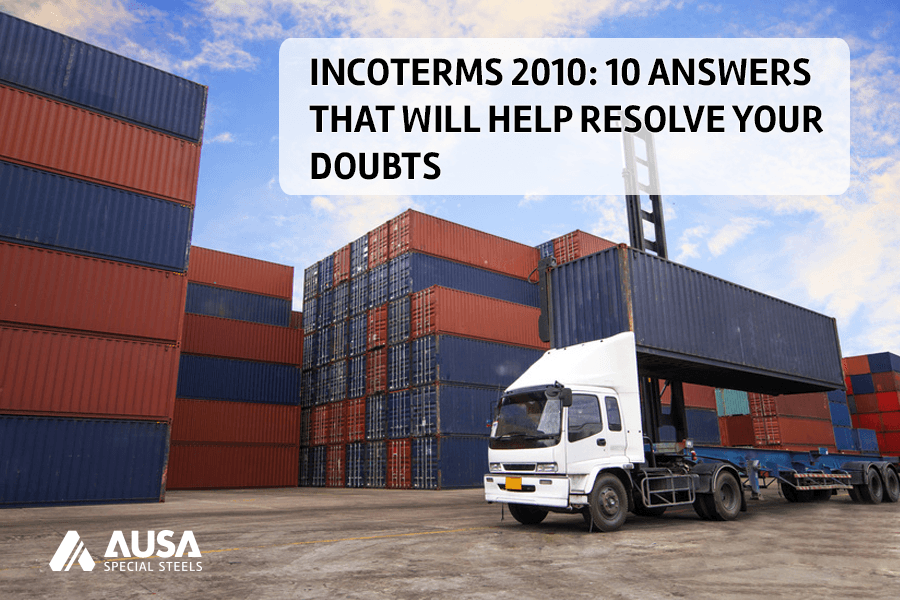I have a friend of a friend who had a very strange experience with the INCOTERMS. Over the years, he had saved some money and decided to start a small business. Things weren’t going badly and he decided it was time for his business to grow.
After thinking about it, he decided that the Chinese market could be a good alternative. He made various contacts and decided to import a container with steel items from that country.
New to this type of operation, he subcontracted a company to manage the contracting and importing of the goods. The transaction went well, but due to the sub-contracting his profits were not quite as he had hoped.
So he thought that next time he would bring the container over himself, without intermediaries.
That second container never got to its destination and the money he had sent in advance was lost. He felt cheated and rightly so, so he made the decision to embark on a long and costly legal process that still has not been resolved.
The problem was that the contract did not properly define the obligations of buyer and of the seller.
He did not know what the INCOTERMS were and so he had not used them to agree the delivery conditions of his last purchase. So everything he had earned through his new business was lost due to this ignorance.
The story I have just told could happen to anyone, so it is always a good idea to go over the key concepts of the INCOTERMS standards.
1.- What are the INCOTERMS?
The “International Commercial Terms” are a set of standard rules for international trade that regulate the delivery conditions for goods. Each INCOTERM clearly defines the obligations and risks of both the buyer and the seller.
Voluntary agreement with the INCOTERMS decreases the risks and legal complications as they are updated and have an infinite casuistry.
2.- Who created the INCOTERMS?
The INCOTERMS were created by the International Chamber of Commerce (ICC) in 1936, an organisation also responsible for maintaining and updating them.
3.- What is the objective of the INCOTERMS?
To simplify and unify trade through standardised commercial rules that regulate the delivery, risk, insurance, costs and means of transport used.
The INCOTERMS are an instrument for facilitating the management of global business; indicating where the obligations of each of the parties begin and end.
4.- How many times have the INCOTERMS been updated?
Since their creation in 1936, there have been 8 versions of the INCOTERMS. They are a dynamic instrument that has to adapt the global changes that take place.
The most recent version of the INCOTERMS was drawn up on 1 January 2011. The previous versions can be used but I recommend using the most recent version that aims to better gather and reflect the casuistry of international trade.
5.- Which language is used?
The INCOTERMS are written in English but they have been translated into the other of languages of the countries that use them. In the event of conflict in the text, the text in English shall prevail.
6.- Are the INCOTERMS necessary?
In my opinion, yes; they are useful. Every country has its own way of doing things. Rules with a common interpretation are an invaluable instrument to facilitate international trade.
The INCOTERMS protect both the buyer and the seller. They avoid conflict and errors and reduce negotiation time.
7.- How do they work?
The buyer and seller reach an agreement. They choose the means of transport that is suitable for both parties. They agree which INCOTERM will govern the shipping of the goods and specify the version of the INCOTERMS. I recommend using the most recent, INCOTERMS 2010.
Each INCOTERM has rules based on the same concepts, but with different meanings.
Each INCOTERM establishes who pays for the transport, the insurance for the journey, customs formalities, and any loading and unloading needed. Who assumes the responsibility and risk, for what and when?
Once the INCOTERM has been accepted, the conditions agreed must be observed by both parties.
It is a way to ensure you are protected when doing business. And, in the worst-case scenario, when third-party intervention is required, the interpretation will be simpler and predictable as they are standard rules.
8.- What aspects do the INCOTERMS not contemplate and must be agreed?
There are parts of the sale contract that are not specified in the INCOTERMS and that must be agreed by both parties before beginning the transaction.
For example:
- The price to be paid for the goods sold.
- The payment method for this transaction.
- The consequences in the event of non-compliance, either by the buyer or the seller.
9.- Can an INCOTERM be invalidated?
Yes, they can be invalidated. For example, the laws that govern a country can cancel parts of the sale contract, as well as the INCOTERM initially selected, if necessary.
10.- Is it possible to create clauses in addition to the INCOTERMS?
You can create clauses. An INCOTERM is binding, but the contract generated between a buyer and a seller is specific and includes the aspects agreed upon by both parties.
I hope these answers have provided the information you need on the importance of the INCOTERMS. I am sure you will have some additional information you would like to share with us. Go for it!
Have you enjoyed reading this? If you liked it, join our community of subscribers. You will receive our content by e-mail every time we publish a post.
If you thought this was good, share this post with your friends on the social networks.








